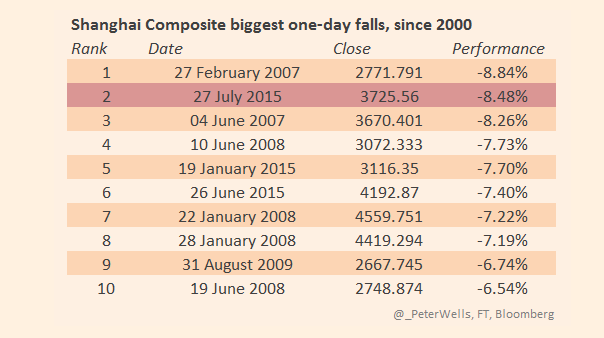
Veteran Labour MP, and long time voice of sanity in the labour party, Frank Field, ponders his decision to nominate Jeremy Corbyn for the leadership.

"value at risk to manageable assets from climate change calculated in this report is US$4.2trn, in present value terms. The tail risks are more extreme; 6°C of warming could lead to a present value loss worth US$13.8trn, using private-sector discount rates. From the public-sector perspective, 6°C of warming represents present value losses worth US$43trn—30% of the entire stock of the world’s manageable assets"Oo-err, missus. It runs to 63 pages but I can't recommend you spend the time. However, as part of the usual C@W service to readers, here are a few comments.

 The height of the silly season approaches. Perhaps this year we thought it would all be about Germans getting lynched on Greek holidays or vice versa.
The height of the silly season approaches. Perhaps this year we thought it would all be about Germans getting lynched on Greek holidays or vice versa.
On the ground in places such as Greece, resistance to austerity and the creation of “networks you can’t default on” – as one activist put it to me – go hand in hand. Above all, postcapitalism as a concept is about new forms of human behaviour that conventional economics would hardly recognise as relevant.Networks you can't default on, eh? Sounds like the mafia to me.
 So there we are, diligently reading the Boy
So there we are, diligently reading the Boy ... delivering a significant expansion in new nuclear power in the UK. The Hinkley Point C power station alone could generate 7% of the UK’s electricity needs 1Well it could, but that's a rather pointed conditional. And what's that little '1', the footnote at the end? The eye falls to the bottom of the page where we read, in 6-point:
1 Job stats from EDFBut job stats are there none! Now we know the government and EDF are bosom buddies - how else to explain, well, anything UK-nuclear really - but what happened when someone at the Treasury was set on to ring up the froggies and ask them how many jobs Hinkley Point will create? Did they just forget? Surely not, at the Treasury!
 Intruding on private grief is a disgraceful thing, I know ...
Intruding on private grief is a disgraceful thing, I know ... Anyhow, to the history books. 5th-century Athens bore some resemblance to 21st-C Brussels, the hub of a semi-imperial set-up, administering a more-or-less compliant collection of diverse and once-proudly-independent city-states and regional entities. Some they had taken by conquest, others had originally been fellow members of the Delian League before it morphed into the Athenian pseudo-empire. In any event they were pretty much obliged to accommodate the wishes of Athens which, for its part, was bluntly guided by its own self-interest, sometimes far-sighted and moderately enlightened, sometimes less so.
Anyhow, to the history books. 5th-century Athens bore some resemblance to 21st-C Brussels, the hub of a semi-imperial set-up, administering a more-or-less compliant collection of diverse and once-proudly-independent city-states and regional entities. Some they had taken by conquest, others had originally been fellow members of the Delian League before it morphed into the Athenian pseudo-empire. In any event they were pretty much obliged to accommodate the wishes of Athens which, for its part, was bluntly guided by its own self-interest, sometimes far-sighted and moderately enlightened, sometimes less so. He was up against something very difficult to fight: the phenomenon of where people's loyalties really lie. Hard to tie this down - but you know it when you see it: when the flag is run up, it's pretty obvious who is saluting. (By the way, I was absolutely of the camp that saw the fundamental repository of loyalty at the unit level*, and I'm clearly in the majority: the thriving old comrades' associations in my part of the Army are all organised along unit lines.)
He was up against something very difficult to fight: the phenomenon of where people's loyalties really lie. Hard to tie this down - but you know it when you see it: when the flag is run up, it's pretty obvious who is saluting. (By the way, I was absolutely of the camp that saw the fundamental repository of loyalty at the unit level*, and I'm clearly in the majority: the thriving old comrades' associations in my part of the Army are all organised along unit lines.)
 I have read now some of the £20 million airport review. Overall, it is quite a weak document. Clearly the agendas of Lobbyists are covered - from both sides so you could say it was balanced. But it is a sort of Mutually Assured Destruction type of balance from the Cold War Era.
I have read now some of the £20 million airport review. Overall, it is quite a weak document. Clearly the agendas of Lobbyists are covered - from both sides so you could say it was balanced. But it is a sort of Mutually Assured Destruction type of balance from the Cold War Era.